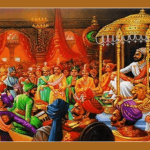Indus civilization, also called Indus valley civilization or Harappan civilization, was the the earliest known urban culture of the Indian subcontinent. Harappa was the centre of one of the core regions of the Indus Valley Civilization, located in central Punjab. Project Work Every student has to compulsorily undertake one project on the findings related to […]
History
Sustainable development Goals of UAE: History Project
Project Topic: “UAE’s commitment to sustainable development is at the heart of the country’s vision for its future. The ideas of sustainable development permeate UAE’s national development plan-Vision-2021-and the plans of its seven Emirates”. Prepare a report/case study on any one of the Sustainable development Goals of UAE.
Human Rights & History (ICSE Class 10)
Q. Highlight the work and achievements of any one Nobel Laureate – Malala Yousafzai or Kailash Satyarthi in promoting human rights and education among women and children. Q. Present a case study of any recent human rights violations and redressal mechanisms available to prevent such instances in the future.
Top Popular Museums in India
There are many popular museums in India that reveals truths of a bygone era. List of Top Museums in India National Museum Delhi Indian Museum Kolkata Government Museum Chennai Chhatrapati Shivaji Vastu Museum Mumbai Shankar’s International Dolls Museum Delhi Salar Jung Museum Hyderabad National Rail Museum Delhi Calico Museum Ahmedabad Dr. Bhau Daji Lad Museum […]
India’s Independence and Partition
Topic: India’s Independence and Partition. The Partition of India of 1947 was the division of British India into two independent dominion states, the Union of India and the Dominion of Pakistan. But the process of partition was attended by mass migration and ethnic violence that has left a bitter legacy to this day. Learning Objectives: […]
The Indian Independence Act of 1947
After sensing the huge resistance to British rule in India, which undoubtedly emerged from the nonviolent mass movement for independence led by Mahatma Gandhi, the British took a political decision after World War II to leave India and began the decolonisation process. Fortunately for Indians, the British acted in a responsible manner before leaving India, […]
Mountbatten Plan: Main Points
Lord Mountbatten (India’s last viceroy) proposed a plan in 1947 according to which provinces were to be declared independent successor states with the power to choose whether to join the constituent assembly or not. Known as the Mountbatten Plan, the plan provided for the partition of India into two states that were granted the rights […]
Quit India Movement
Under the leadership of Mahatma Gandhi, people across India came together as part of the Quit India Movement to uproot British imperialism. In 1942, in a fiery speech in Mumbai, Mahatma Gandhi gave a ‘do or die’ call to the people of India in a final push to make the British quit. The Quit India […]
Civil Disobedience Movement
The Civil Disobedience Movement was one of the most significant movements launched by Mahatma Gandhi in the course of India’s freedom struggle. After observing 26 January as Poorna Swarajya Day (Independence Day) in 1930, the Indian National Congress (INC) decided that civil disobedience was going to be the primary means by which Independence for India […]
Non-Cooperation Movement
The non-cooperation movement was launched on 5th September 1920 by the Indian National Congress (INC) under the leadership of Mahatma Gandhi, marking a new awakening in the Indian Independence Movement. After a series of events including the Jallianwala Bagh Massacre, Gandhiji realised that the only way forward was to get the British government to grant […]
Mass Phase of the National Movement (1915-1947) (Gandhian Era)
The final and the decisive phase of the Indian Nationalist Movement [1917-1947], also known as the Gandhian Era, began after Gandhiji returned to India from South Africa in January 1915. This period belonged to Mahatma Gandhi as he emerged the biggest leader of the National Movement in British India. Gandhi was successfully able to convert […]
The Assertive Phase (1907 – 1916) of Indian National Movement
Here are the main features of the Assertive Phase (1907 – 1916), some also refer to the period (1905-1918), (1906-1916). Growth of Assertive Nationalism People finally started seeing the true side of the British rule and were convinced that the British were to be blamed for the economic ruin of India and her growing poverty. […]
Mother Teresa: Biography
One of the greatest humanitarians of the 20th century, Mother Teresa, along with her sisters of the Missionaries of Charity, became a symbol of love, care and compassion for the world. Mother Teresa, considered by many as one of the 20th Century’s greatest humanitarians, was canonized as Saint Teresa of Calcutta in 2016. She even […]
Sarojini Naidu: Facts about India’s nightingale
Sarojini Naidu, also known as the Nightingale of India (or Bharatiya Kokila) was a political leader, independence activist, poet, and a feminist, and played a vital role in India’s struggle for freedom and in promoting women’s rights in India. Birth Date: February 13, 1879 Death Date: March 2, 1949 Sarojini Naidu was born to Aghorenath […]
Three phases (stages) of the Indian National Movement
The three phases (stages) of the Indian National Movement. The history of the Indian National Movement can be broadly classified into three phases (stages): The Early Nationalist Phase (1885-1905): This was the phase of moderate nationalism when educated leaders from the Indian National Congress (INC) wanted to do their bit for the country, but by […]
Chhatrapati Shivaji: The great escape from Aurangzeb’s clutches
Here’s an interesting chapter from the pages of history – Shivaji Bhosale’s great escape from the clutches of Aurangzeb after the later had put Shivaji Maharaj under house arrest. Shivaji Maharaj found great success against the Mughals using his guerilla tactics, much to the dismay of Aurangzeb. After Shivaji defeated Shaista Khan (Shayista Khan), in […]
Chhatrapati Shivaji Maharaj: The Maratha Warrior
Shivaji Raje Bhosle was born to Shahaji Raje and Jijabai on 19th February, 1630, at the hill fort of Shivneri in Pune. He was named after the goddess of the region, Shivai. Early Childhood As a child, Shivaji Maharaj spent a lot of time exploring the lands around the fort. He grew up knowing every […]
Difference Between Allied and Axis Powers, the two warring groups in WWII
World War 2 remains the deadliest conflict known to humankind claiming the lives of around 70 to 85 million people. The war involving several countries waged from 1939 to 1945, with the various warring nations eventually forming two opposing military alliances known as the Allies and the Axis Powers. So World War 2 was fought […]
Difference between dominion status and complete independence
What is dominion status? Is it similar to independence? If not, how does it differ from complete independence? Just before India got independence, there were several proposals put forth by the British Government, one of which was the proposal to give India a Dominion Status. However, it was not acceptable to Indian leaders who wanted […]
What is Balkanization?
Balkanization refers to the division of a larger region or state into several smaller regions or states, often weaker and hostile to one another. Before India got independence, several proposals were put forth by the British Government, of which one was to divide India into several smaller countries. However, Jawaharlal Nehru vehemently opposed that proposal […]


